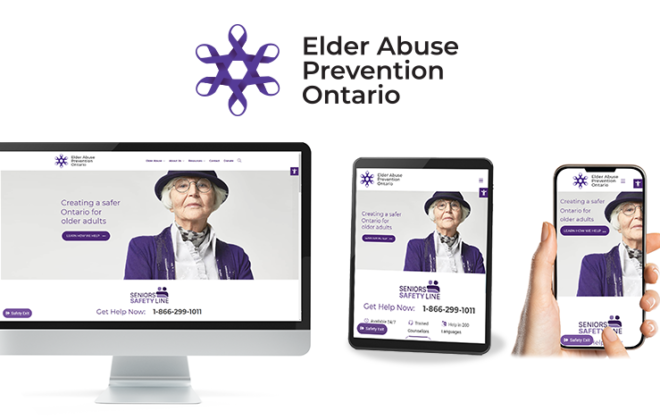Hearing and Seniors
Did you know that 47% of Canadians over the age of 60 suffer from hearing loss, ranging from the inability to hear certain voices to deafness?
A senior with hearing loss not only struggles with hearing alarms or telephones, or understanding speech on TV or radio, they may also be unaware that someone is talking or whispering. They may have a lack of understanding when talking on the phone or even speaking to their doctors.
Types of Hearing Loss
Hearing loss comes in many forms. It can range from a mild loss, in which a person misses certain high-pitched sounds, such as the voices of women and children, to a total loss of hearing.
Categories of Hearing Loss:
- Sensorineural hearing loss occurs when there is damage to the inner ear or the auditory nerve. This type of hearing loss is usually permanent.
- Conductive hearing loss occurs when sound waves cannot reach the inner ear. The cause may be earwax buildup, fluid, or a punctured eardrum. Medical treatment or surgery can usually restore conductive hearing loss.
Sudden Hearing Loss
Sudden deafness, is a rapid loss of hearing. It can happen to a person all at once or over a period of up to 3 days. This is a medical emergency. If you or someone you know experiences sudden sensorineural hearing loss, visit a doctor immediately.
Presbycusis — Age-Related Hearing Loss
Presbycusis, comes on gradually as a person gets older. It seems to run in families and may occur because of changes in the inner ear and auditory nerve. Age-related hearing loss can make it hard for a person to tolerate loud sounds or to hear what others are saying. It usually occurs in both ears and because the loss is gradual, seniors with presbycusis may not even realize that they have lost some of their ability to hear.
Tinnitus — Ringing in the Ears
Tinnitus is also common in older adults and is a symptom, not a disease. Heard in one or both ears, Tinnitus is typically described as ringing in the ears, but it also can sound like roaring, clicking, hissing, or buzzing. It often comes and goes.
Something as simple as a piece of earwax blocking the ear canal can cause tinnitus, but it’s sometimes the first sign of hearing loss in older adults.
Tinnitus can accompany any type of hearing loss and can be a sign of other health problems, such as High Blood Pressure, Allergies, or as a side effect of Medications. So be sure to talk to your doctor if you’re experiencing ringing in the ears.
Negative Psychological & Emotional Effects
Seniors with hearing loss may suffer negative psychological and emotional effects that can affect them socially. Here are some examples of what they may experience:
- Feeling ashamed, inadequate, stupid, awkward, embarrassed, humiliated, or abnormal.
- Difficulty thinking or concentrating, which can result in being distraction and boredom.
- Worry about loss of significant relationships and about being seen as incompetent.
- A feeling of worthlessness, which could cause withdrawal from others and a lack of participation in everyday living.
4 Key Things to Know
1. It’s not good to put off addressing hearing loss.
- Hearing loss has a significant impact on social relationships.
- Friends and families become tired of all the extra effort required to communicate when there is hearing loss, and may engage less with a person. Spouses, in particular, can become very frustrated.
- Workplace performance and relationships can be affected, and this can negatively impact an older person’s job and ability to maintain their job.
- People with un-addressed hearing loss are more likely to become socially isolated.
2. Don’t assume that your primary care doctor will notice hearing loss or initiate a suitable evaluation.
- Doctors may not notice you’re having trouble hearing.
- Patients and families should be proactive in bringing up hearing loss and in asking their health providers to address it.
- The sooner your doctor knows the sooner they can help.
3. Consider All Options to Help
Why this is important:
- Hearing aids can be very effective, but they aren’t right for everyone and not everyone is a good candidate for hearing aids.
Talk to your doctor about all your options.
Other Approaches That Can Help
- Assistive devices for phones
- Assistive devices for TVs and other devices
- Better communication strategies, such as seeking quieter places to talk when possible and directly facing the person with hearing loss, so they can see the face and lips of a speaker.
4. Higher Frequency & Distortion of Sounds.
It’s important to understand that age-related hearing loss causes distortion, not muffling.
- People with hearing loss will often say they can hear.
- They’re right, they CAN hear! But their hearing loss makes it harder for them to hear certain speech frequencies, which leads to distortion of sound and confusion.
- It’s usually not helpful to shout at someone with age-related hearing loss because you’ll just be making a distorted sound louder.
- Many people struggling with age-related hearing loss have trouble hearing words spoken at a relatively high frequency. This is why some older adults have difficulty understanding children, and other high-pitched voices.
Do You Have Hearing Problem?
Ask yourself the following questions.
- Do I have a problem hearing on the telephone?
- Do I have trouble hearing when there is noise in the background?
- Is it hard for me to follow a conversation when two or more people talk at once?
- Do I have to strain to understand a conversation?
- Do many people I talk to seem to mumble or not speak clearly?
- Do I misunderstand what others are saying and respond inappropriately?
- Do I often ask people to repeat themselves?
- Do I have trouble understanding the speech of women and children?
- Do people complain that I turn the TV volume up too high?
- Do I hear a ringing, roaring, or hissing sound a lot?
- Do some sounds seem too loud?
If you answered “YES” to 3 or more of these questions, you could have hearing issues speak to your doctor and have your hearing checked.
The sooner you talk to your doctor the sooner you can get the help you need.
Article originally appeared at: https://www.canes.on.ca/
Author: Canes Community Care





